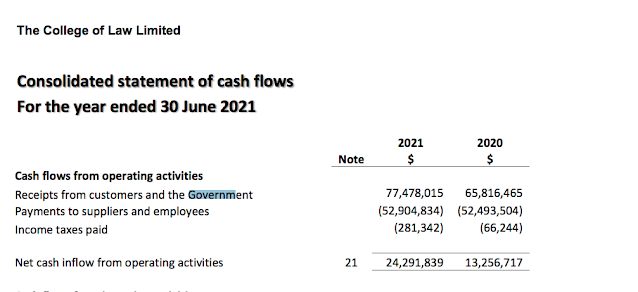by Ganesh Sahathevan
Andrew Bell has been described as ‘one of the most brilliant in a generation’The College of Law Australia's Practical Legal Training (PLT) course has been condemned by the Chief Justice NSW Andrew Bell, for offering a PLT course that is not worth the money. Bell has now embarked on a campaign to reform the PLT.
Bell is not only Chief Justice but also chairman of he MSW Legal Profession Admission Board that accredits the College as a PLT provider so it is not surprising that Bell's outburst has caused others to offer their own frank assessment of the College's PLT.
Senior practitioners and recent graduates from the 15-week practical legal training course, which requires only five days of in-person attendance and is taught mostly online, criticised its lack of rigour and utility.
They acknowledged a normalisation of cheating by sharing past answers to recycled exam questions and deploying ChatGPT to generate responses.
One junior lawyer, who completed the course last year and now works in the public sector, said prior fees of up to $12,000 were “transparently extortionate, and everyone knows that’s going in. It’s a necessary prerequisite for admission, and students know they won’t gain anything from it”.
“I didn’t feel like I was getting value for money once. Coming from university where academic rigour was held in high regard, to be paying for mundane and reductive online tasks felt like a slap in the face. In order to justify that price, the standard should be a lot higher,” said the lawyer, who asked for anonymity to speak more freely.
Another junior lawyer, who paid for the course themselves and now works at a community legal centre, said staff did little to combat students’ dim view of the course.
“There’s kind of this unspoken vibe between teachers and students that it’s all pretty bullshit,” they said.
“Written assessments follow the same formula for every subject … but no one puts any effort into them. People either copy someone else’s [answers] or use ChatGPT.
“You can upload the course documents to ChatGPT and ask it to write a letter of advice. I did that and passed everything.”
In light of the above PLT graduates have now a certificate that cannot be said to add anything to their professional standing and if anything embarrasses them. It follows that PLT graduates and students are entitled to recovery of their fees.The College should in fact be providing past and current students with proposals for refund of fees paid for services that were obviously not of the standard promised. Failure to do so, very soon, can be remedied by a class action.
Complaints about the College's PLT are not new, but the College and its senior managers have always enjoyed the protection of their Chief Justice, which has allowed them to act with impunity.
TO BE READ WITH
Government funding for the College Of Law PLT where students are assessed on the quality of their reflection on their work experience , not the quality of their work experience
by Ganesh Sahathevan
The above has been extracted from the latest College Of Law Ltd's annual report. The substantial government funding is provided via the Commonwealth's FEE HELP facility.
Very many questions remain unanswered with regards the College Of Law's joint venture with Malaysia's Bar Council.
UK's The Lawyer reported recently that the College Of Law Sydney has decided to break into the UK market, to"battle BPP and ULaw for super-exam supremacy".
Quoting College CEO Neville Carter The Lawyer reported:
“The hallmark of the Australian model is delivery of learning directly into the workplace within a very flexible framework of work placement. The model drives access to the legal services market and fuels the growth of employment opportunities. We believe that the reforms in England and Wales provide an opportunity for us to share what we have learnt in Australia and across Asia and assist in shaping new models and pathways in England and Wales.”
Carter has yet to explain his exaggerated claims of having reformed Malaysian legal practise in the mid 80s; in fact the College's latest venture into Malaysia seems to have ended in failure, again leaving many unanswered questions.
The College has refused to explain why its website dedicated to its "LLM" in Malaysia no loner works, nor has it been replaced with anything similar.
As previously reported, the College seems to have a tendency to invest its mainly government funded revenue in vanity projects in exotic locations at the expense of its core business of providing the Professional Legal Training course that must be completed by anyone seeking admission to practise in NSW.
Complaints against the College are ignored by its regulator, the NSW Legal Profession Admission Board, which is chaired by the Chief Justice of NSW,who considers it the height of bad behaviour to question the relevance and quality of the College's teaching standards, despite students here having to normally take on a debt of about AUD 10,000 to pay for about 3 months worth of on-line learning, most of which is self taught with minimal input from instructors.
END


No comments:
Post a Comment